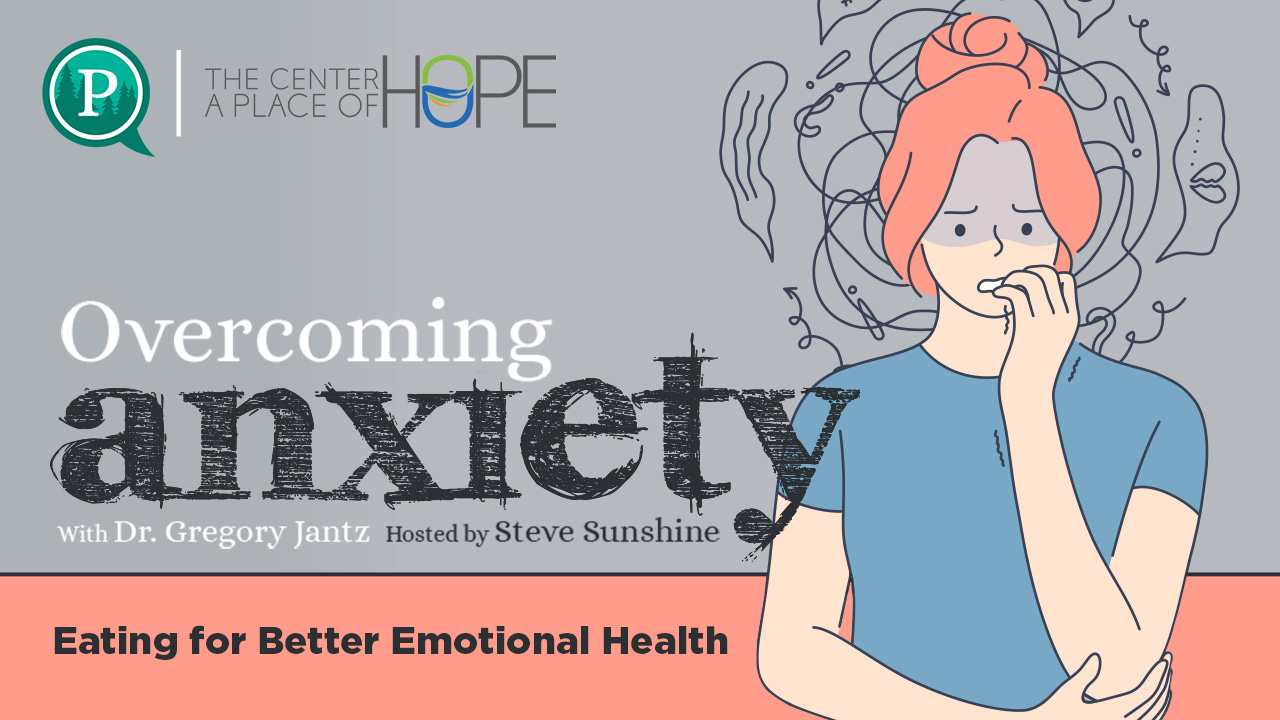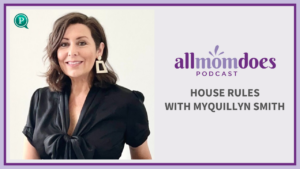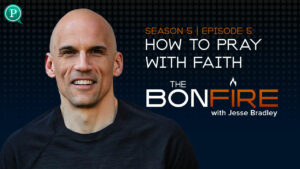Did you know what you put in your mouth can impact your emotions? Steve Sunshine hosts Dr. Gregory Jantz to talk through how eating can make a big difference in how we feel.
Book: Anxiety Reset
Transcription:
Dr. Gregory Jantz: Vitamin D has a lot of implications ultimately for emotional wellbeing. So, you know, some of this is, is an easy test. Doctor can look at your vitamin D level, and people do realize, man, when I put these back in, as God designed my body to work, I feel better.
Steve Sunshine: Well, you probably already know that what we eat can affect how we feel physically, but did you know that our eating habits can also affect our emotions? Hi, I’m Steve Sunshine and welcome to Overcoming Anxiety, a five-part podcast from Purposely. This is episode three, eating for better emotional health.
Our guest for the entire series is Dr. Gregory Jantz, founder of The Center – A Place of Hope, and author of the Anxiety Reset. In this episode, we’re going to talk about how what we eat affects the way we feel emotionally. Here’s my conversation with Dr. Jantz.
Steve Sunshine: What I eat can make a difference in how anxious I feel. Is that right? That, cause it sounds like bad news.
Dr. Gregory Jantz: Ultimately what goes in your mouth does matter. What does that look like? Well, I’ll give you an example. Uh, one individual we worked with, and I have permission to share this story, had gone, been depressed for years. He found himself here at The Center – A Place of Hope, and one of the things that nobody had ever asked him is what do you put in your mouth? He goes, what do you mean? What do you eat? What do you drink? He goes all these years of trying all these different medications and seeing all this, these different treatment programs, nobody has ever asked me what I put in my mouth. Okay. But here’s what we discovered, he had worked him, himself up, it didn’t happen instantly, but over time, where he was consuming about 12 pots of coffee. Pots.
Steve Sunshine: Pots? He was bouncing off the walls.
Dr. Gregory Jantz: Well, how do you know? How do you get, how do you drink that much coffee? And here’s his answer was. He goes, what, you know, it’s just that home. He worked, he actually worked from home. It’s just that home coffee pot, you know, it’s not those huge ones. What’s a home coffee pot hold? 12, 14 cups? I don’t know. But the morning all through the day, that’s kind of what he did now. Can you be, and I think, would you be depressed? Would you be anxious? What does that do to you, do that for 20 years, like he did? So, what we put in that was an extreme example, but what we put in our mouth, matters. Just how God designed us. If we’re depressed, we tend to love things that are sweet and smooth. Oh, the depressed. We love the ice cream, for example. And you’re going to go towards things that immediately make you feel a little better. Their mood elevating. Then you feel worse.
Steve Sunshine: Yeah. So, um, what are some foods that we need to stay away from in general? Or, or is it just about moderation?
Dr. Gregory Jantz: You know, I hate to say here’s good list. Here’s the bad list. Uh, we have a couple of dieticians on staff. We help everybody who comes to us, improve their nutrition because it makes a difference. But what I, and most, here’s what I realize most people know what’s healthy. It’s just that we don’t always do it. Most people know, and I’m holding my bottle of water here, and know that we need to be drinking a fair amount of water every day. Water improves mood. It helps blood pressure and helps improve concentration. Water does a lot of things for us. So, um, we know what’s good to do. And part of it is making a decision, and maybe what you ought to do is keep a food diary for, for a week. For seven days, record everything you put in your mouth. Sometimes you look back and go, oh wow, that can be quite enlightening.
So, but what we want to do, and there is something to be said for, you know, I’m not going to use the word diet or going on a special diet. Um, but there are times where we can look at, okay, I’m going to really work on cutting back. My wife has a thing, she goes, I’ve never been on a diet, but I cut back. You know, cut back. Well, that’s pretty easy. I can do that.
Steve Sunshine: Yeah. The food diary, make sure that you actually are, and it doesn’t just feel like you’re cutting back. You’re thinking I only six cookies last night.
Dr. Gregory Jantz: Sometimes we need some help with this, um, to help us out. Fundamentally, most people know, you know, okay, so the person that gets up and they’re you wake up in the morning and you’ve got low blood sugar and you didn’t, you didn’t have any source of protein in the morning and all you did was drink 10 cups of coffee. Well, that’s not going to help you. That will have an emotional implication eventually.
Steve Sunshine: Yeah. What about, uh, what about supplements? And what’s your thought on, on, on those? I know that’s a broad question because there are lots of different kinds, but just in general.
Dr. Gregory Jantz: You know, we have naturopathic physicians that work for us, so I had tended to be quite pro supplements because I see the difference it can make in a person’s life. If you’ve struggled with addiction in your life, and your nutrients are deficient, and B vitamins are nearly non-existent, you know, we even, we even do what we call IV nutrient therapy. We put together where, you know, after an examination and blood work, we begin to look at well, what is your body likely low? And, and they’ll doctors will make a custom item of nutrients and give it to you, IV. I’ve done this. It’s, it’s easy. And I started to say it’s fun. I don’t know if it’s fun, but it has good results.
Steve Sunshine: Yeah. Yeah. Which is fun when you get good results. So, um, if, if you’re thinking, if somebody is feeling anxious, should they go to take a particular supplement, or is that something that you really need to talk to a professional about first?
Dr. Gregory Jantz: I really am one that, you know, talk to a good healthcare provider. We know, for example, during the last two years, there’s been a lot of testing for vitamin D. Vitamin D is super important for the immune system. Has a lot to do with viruses and viral load. Um, vitamin D is a supplement that is easily taken, and you test in your blood work. And you would not believe how 80 plus percent of the folks that we see have low vitamin D levels. Now, vitamin D has a lot of implications ultimately for emotional wellbeing. So, you know, some of this is, is an easy test. Doctor can look at your vitamin D levels, and people do realize, man, when I put these back, as God designed my body to work, um, I feel better.
Steve Sunshine: Yeah, I can then it only makes sense. The exercise has got to fit into this somehow, as soon as you talk about diet, you have to talk about exercise. I think that’s some kind of rule.
Dr. Gregory Jantz: Okay. So, exercise is kind of like the word diet for most folks who go, I don’t want to talk about it. You feel like you failed before you started. Use whatever word you want but increase your activity level. Now, we will work with folks that go, man, I can’t do. We always, we do fitness assessments when somebody comes, and we put together a plan. Um, recently we had somebody here and he goes, you know, I could barely walk around the block. It took energy to just get around the block. Okay, after about four weeks here, he was doing a big loop around six blocks, because, um, it’s something we walk into and literally walk into a bit slowly. And I think we need to work on increasing our activity. I’ll tell you what huge difference in our emotional wellbeing. It’s just the way we were designed.
Steve Sunshine: Why does that work?
Dr. Gregory Jantz: Well, it works for a lot of reasons. Um, exercise and staying active. Uh, we know how important this is. Um, heart health for example, we know how important it is for our joints, and the chemicals that are released. The endorphins and the body chemistry that is altered in a positive way by consistently exercising. It’s huge benefit. There are even some for people who have suffered from some mild depression, there’s even some really good studies, um, moderate exercise for mild to medium depression, uh, actually outperformed an anti-depressant.
Yeah, well, I’m not saying get rid of the antidepressant, but what I’m saying is it makes a difference.
Steve Sunshine: Sure. And obviously with that, without the potential for side effects and that sort of thing. How is part of it like, exercise indoors versus outdoors? Does it matter? Um, I know that, you know, depending on what time of year it is, that’s going to play into it. But I mean, just is part of that just about change of scenery, fresh air, that sort of thing, too. Especially with the pandemic and all of that.
Dr. Gregory Jantz: Oh yes. Get out, take five deep breaths. Get out there. We need that. And we need the outdoors, and by the way, find somebody to go on walks with. Find somebody to go on hikes with. Get out and start to re-enjoy God’s great outdoors. It makes a difference.
Steve Sunshine: That’s awesome. So how was the best way to get started in a new diet? Uh, little, we’re not gonna use the word diet, Cause we don’t like that word nutrition and, and, and fitness plan for, to try to fight anxiety?
Dr. Gregory Jantz: Well, I think the best way to get started is get some new information. Um, the book, Anxiety Reset, for example, um, begin with a game plan.
I put together a 12-week plan, which helps, cause we need to do this over time. And it’s everything from my sleep hygiene, hey, how about this? We know I used to work in sleep research. We know that sleep not getting enough time in certain sleep stages, it will have an emotional impact. It can give you a depressed brain and an anxious brain.
So, we’ve got to look at sleep, sleep hygiene. How do I improve my sleep? Uh, definitely, we are in the middle of a sleep epidemic. We have many folks struggling with sleep disorders right now. So, that’s gotta be addressed. So, putting it all together, but here’s what happens, you know, each week we add something new we’re going to work on, and you’d be amazed, after 90 days you go, wow, so many changes. It’s baby steps each day, and we can do it. And if we struggle with it, let’s get some help. It’s worth it.
Steve Sunshine: Special thanks to Dr. Gregory Jantz of The Center – A Place of Hope, for joining us for this series. In our next episode, I’ll talk with Dr. Jantz about how to start your own personal anxiety reset plan, so make sure to follow this podcast and get the next episode of Overcoming Anxiety. Thank you for tuning in, and don’t forget to share this podcast with a friend. This podcast is part of Purposely, a podcast network designed with practical podcasts to help you find and live in God’s purpose for your life. Find more amazing podcasts, just like this, at onpurposely.com.








